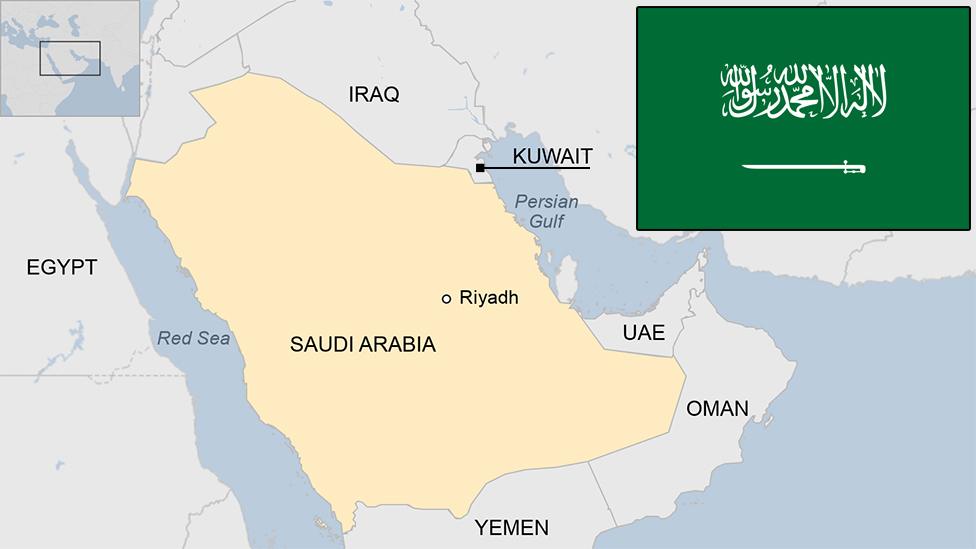How serious is the 'rift' in US-Saudi relations?
- Published
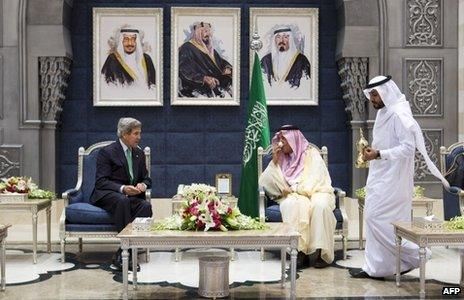
The United States and Saudi Arabia have been allies since 1932
The Saudis are upset with Washington. But just how upset? Enough to break off co-operation over Syria, as has been suggested this week?
With conflicting messages coming from senior princes, it is hard to tell.
But the signs are that Washington's most important strategic Arab partnership is now suffering the biggest strains since it emerged that 15 of the 19 suicide hijackers who had attacked the US on 9/11 were Saudis.
'Major shift'
First came the shock announcement on 18 October that Saudi Arabia was turning down its two-year non-permanent seat on the UN Security Council in protest at the international body's apparent inability to resolve either the Syrian or Palestinian situations.
Then on Tuesday it was widely reported that the Saudi intelligence chief, Prince Bandar bin Sultan, had told European diplomats his country would be making "a major shift" in its relations with the US.
Largely in protest over Washington's reluctance to get involved militarily in Syria, the prince reportedly said Saudi Arabia would be scaling back its co-operation with the CIA over arming and training Syria's Sunni rebels.
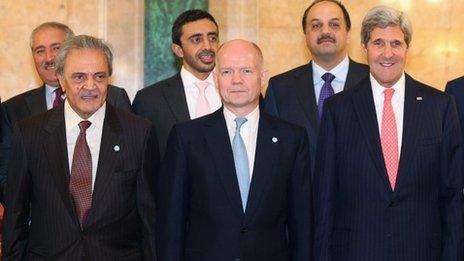
There was no apparent rift between Prince Saud and John Kerry in London
On the same day, another senior Saudi royal, Prince Turki al-Faisal - the former intelligence chief and ex-ambassador to the US and UK - gave a speech in Washington damning President Barack Obama's policies on Syria as "lamentable".
He dismissed the US-Russian deal to dispose of Syria's chemical weapons stockpile as a trick to excuse Mr Obama from having to order military action there.
Yet at the very same time, Saudi Arabia's Foreign Minister, Prince Saud al-Faisal, was sitting comfortably next to his US counterpart, John Kerry, first in Paris on Friday and then on Tuesday in London as they worked on finding a political solution to the Syrian conflict.
US diplomats say they have received no formal notification of a change in relations and that US-Saudi co-operation is solid and will continue. So what is really going on?
List of complaints
Firstly, Prince Bandar has a reputation of being somewhat at the megaphone end of Saudi communications.
Despite spending 22 years as Riyadh's ambassador in Washington, he has a penchant for making overly dramatic gestures and statements that in the past have led to his exclusion from the inner circle of Saudi policy making.
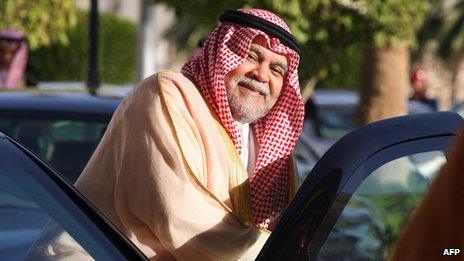
Prince Bandar reportedly said he planned to limit interaction with the US
It is not clear whether his words carried the full backing of King Abdullah, now nearly 90 years old, who retains ultimate authority.
But one senior diplomat in Riyadh remarked: "The words may not be the king's, but the sentiment is the same: the Saudis are seriously upset with Washington, they feel they are not being listened to."
The other Saudi royal who spoke out, Prince Turki al-Faisal, may be the brother of the foreign minister but he does not speak officially for the government. However, his words are closely listened to in Western capitals.
Yet beyond the statements and signals, the Saudis do have a growing list of complaints and differences in their relationship with Washington, which are as follows:
Syria: The Saudis want to see Syria's President Bashar al-Assad gone and Iran's influence over that country diminished. They are frustrated that this is taking so long and that Washington is proving so cautious about arming the rebels. When the US appeared poised to launch cruise missile strikes against Syrian government positions following the 21 August chemical weapons attack near Damascus, the Saudis privately welcomed this. The Crown Prince and Defence Minister, Prince Salman, broke off his holiday and flew home to prepare for the expected conflict only for it to be averted by a Russian-brokered deal to destroy Syria's arsenal of chemical weapons. The Saudis were deeply disappointed as this left Syria's president stronger and the rebels weaker. The view in Riyadh was that this was a deal to suit Israel at the expense of Syria's desperate population. Differences have also emerged about which rebels should receive which arms, with Washington continuing to worry - with some justification - that sophisticated weapons could end up in the hands of jihadist fanatics with a transnational terrorist agenda.
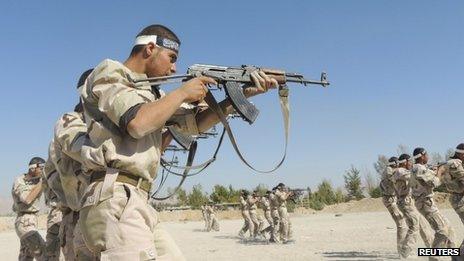
The Saudis are frustrated by US caution over the arming Syrian rebels
Iran: The Saudis are deeply worried that with a new, less confrontational, president in Iran, the Americans will somehow "go soft" on that country, bury their differences and form a grand bargain with Tehran that fails to take sufficient account of Saudi security fears. Ever since Iran's Islamic revolution in 1979, Saudi-Iranian relations have ranged from uneasy accommodation to downright vitriolic. As the Middle East's two heavyweights, Sunni-majority Saudi Arabia vies with Shia-majority Iran for power and influence. Syria has effectively become their proxy battlefield, with each country arming the opposing side. The Saudis now fear that Washington is edging towards a compromise deal with Tehran that slows or halts Iran's nuclear enrichment programme but leaves it free to stir up trouble - in Saudi eyes - in Bahrain, Yemen and even in Saudi Arabia itself.
Egypt: The Saudi princes were shocked and dismayed by how quickly Washington abandoned its longstanding regional ally, President Hosni Mubarak, when the Arab Spring swept him from power in 2011. It got them thinking: "Would they stand by us if the same happened here?" Although Saudi Arabia is the birthplace of Islam, its rulers do not like or trust the Muslim Brotherhood. They suspect it of seeking to overthrow all the hereditary monarchies in the Gulf, and they strongly disliked the short-lived rule of the President Mohammed Mursi, a member of the Islamist movement, in Egypt. While Washington appeared to disapprove of his removal from power by Egypt's military in July, Saudi Arabia and its allies Kuwait and the UAE lost no time in bankrolling the new interim government in Cairo.
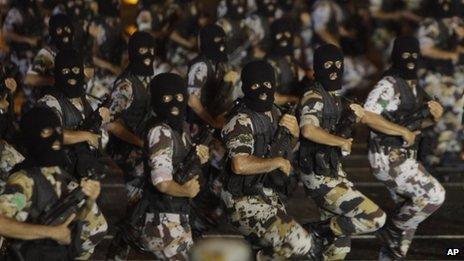
The US has given the Gulf kingdom security and military assistance
Bahrain: What happens in Bahrain matters to the Saudis. The princes have made it clear they will never tolerate a Shia-dominated Islamic republic on their doorstep in Bahrain, and when mass protests there threatened that tiny island's Sunni rulers in 2011, Riyadh sent troops to guard its key sites. Although Bahrain is home to the US Navy's 5th Fleet, Washington has criticised the government's human rights record and put pressure on it to grant more rights to its Shia majority community. As far as the Saudis are concerned, this is none of Washington's business and they would rather it did not get involved.
Oil and the pivot to Asia: This is a longer-term but still serious worry for the Saudis. They know that the US is due to become self-sufficient in energy, thanks to shale gas. That means that in future years Saudi Arabia's swing producer role within Opec oil cartel will decline in relative importance for Washington. Coupled with this is the US announcement in recent years of a strategic shift - a "rebalancing" of forces - away from the Middle East to the Asia-Pacific region. For more than 50 years, Saudi Arabia and its Gulf Arab neighbours have grown used to living under the umbrella of a sizable US military presence. Now they are looking at a future where, despite state department assurances, that may not no longer be the case.
But none of these Saudi complaints is likely to herald an end to a profound security pact that has already endured such challenges as the 1973 Arab oil embargo and the fallout from the 9/11 attacks.
Saudi-US cooperation in counter-terrorism runs deep, with the CIA and FBI providing much of the technical expertise that has helped Saudi Arabia largely eliminate its al-Qaeda problem or drive its members over the border into Yemen.
The powerful Interior Minister, Prince Mohammed bin Nayef, will be in no hurry to see that co-operation jeopardised.
- Published21 October 2013
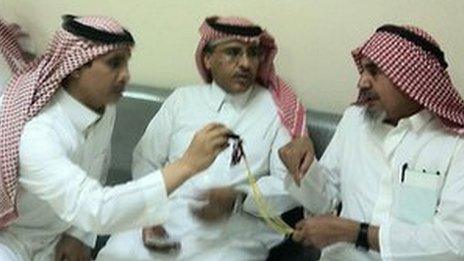
- Published18 October 2013
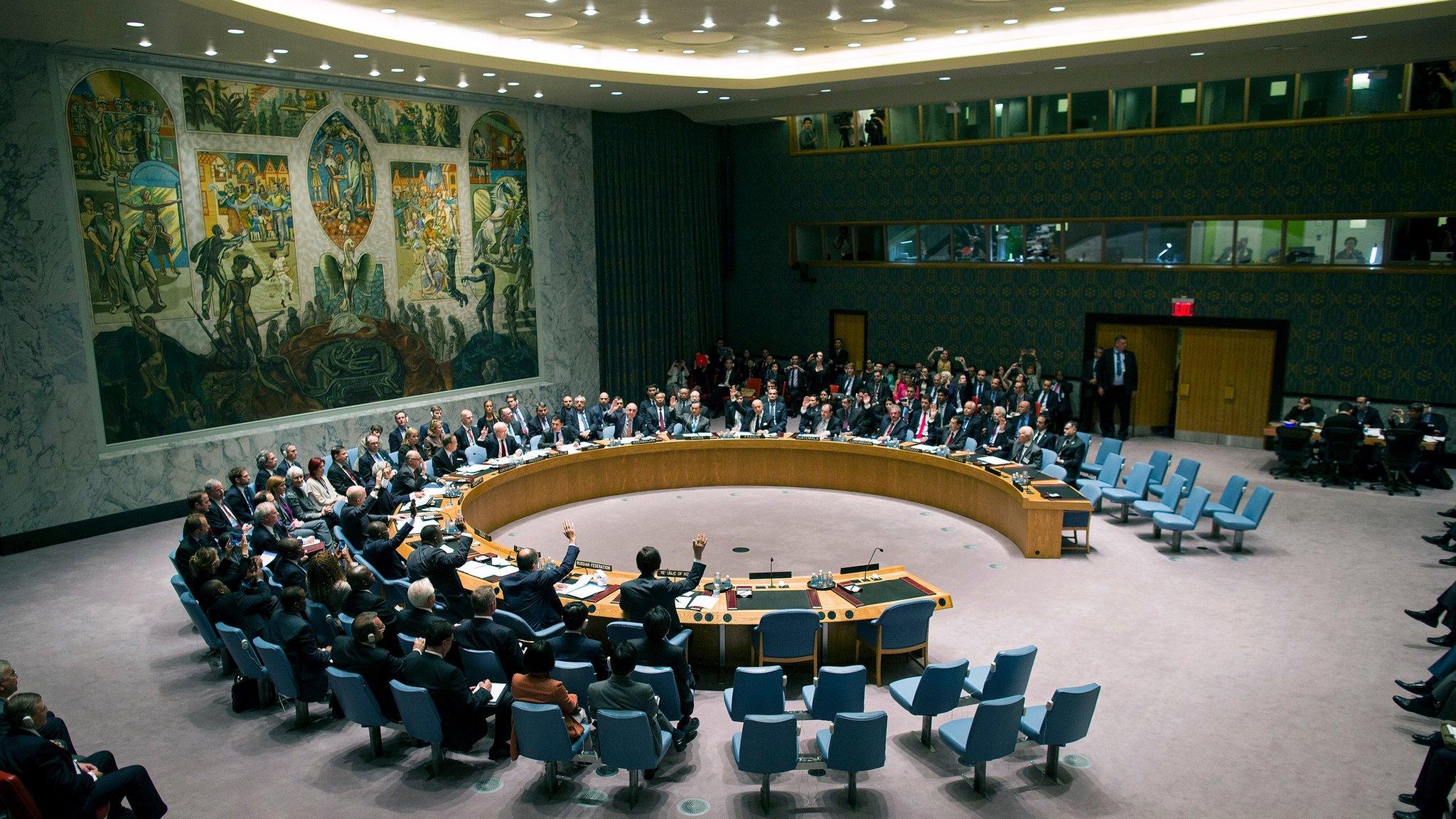
- Published7 April 2013
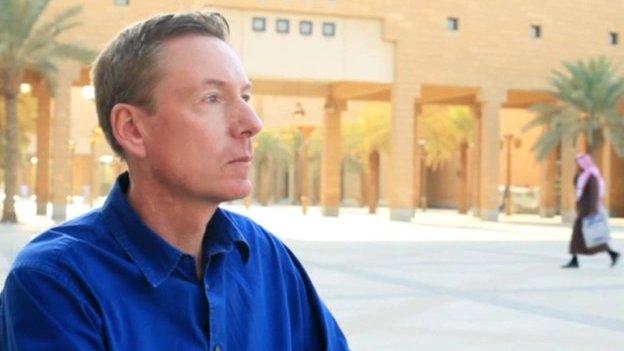
- Published29 August 2023
